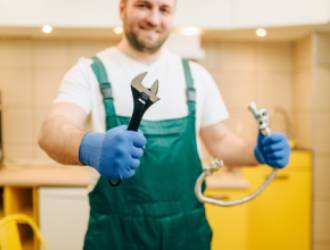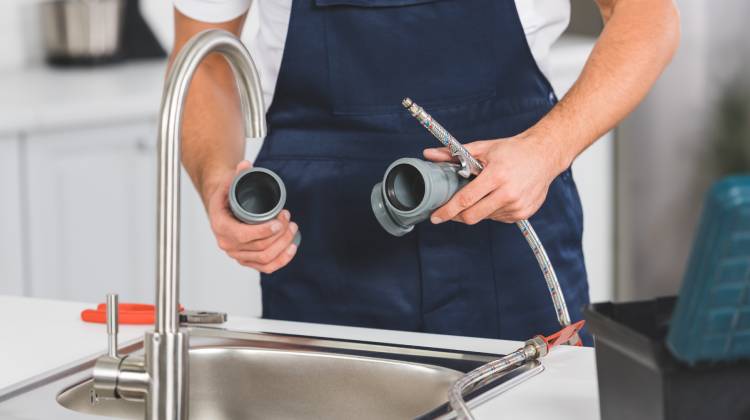A well-maintained plumbing system is crucial for the efficiency and longevity of your home’s infrastructure. Unfortunately, homeowners often make errors that can lead to significant problems. Here’s an in-depth look at common plumbing mistakes and expert tips on how to avoid them.
1. Ignoring Slow Drains
Ignoring slow drains might seem harmless initially, but this can be a precursor to more serious plumbing issues, such as severe blockages or even pipe bursts from built-up pressure.
How to Avoid: Don’t overlook slow drains. Regular maintenance like weekly flushing with vinegar and hot water can keep things moving smoothly. If the issue persists, it might be time to manually remove buildup with a plumber’s snake or call in a professional.

2. Using Chemical Drain Cleaners
While they offer a quick fix, chemical drain cleaners can cause long-term damage to your plumbing. The harsh chemicals can eat away at old pipes and cause leaks or breaks.
How to Avoid: Instead of reaching for a chemical cleaner, try a combination of baking soda and vinegar followed by hot water, or use a plunger or manual snake. These methods are less harmful to your pipes and just as effective at removing clogs.
3. Attempting DIY Repairs Without Proper Knowledge
DIY plumbing can lead to further damage if not done correctly. It’s easy to underestimate the complexity of plumbing systems, leading to incorrect installations or repairs that can cause leaks and water damage.
How to Avoid: Always do thorough research before attempting any repairs and consider the complexity of the job. If in doubt, it’s safer and potentially more cost-effective to hire a professional plumber.
4. Over-Tightening Fittings
It’s a common reflex to tighten plumbing fittings as much as possible, but over-tightening can damage threads and fittings, leading to cracks and leaks.
How to Avoid: Use the appropriate tools and tighten fittings firmly, but stop once you feel significant resistance. If a leak appears, a slight additional turn is often enough.
5. Flushing Inappropriate Items Down the Toilet
Toilets are not garbage disposals and are only meant to handle human waste and toilet paper. Flushing anything else is one of the leading causes of major sewer blockages.
How to Avoid: Keep a trash bin nearby for disposing of things like wipes, feminine hygiene products, and other non-degradable items. Educate your family about the importance of this practice.
6. Neglecting Appliance Hoses
Rubber hoses on appliances like washing machines can deteriorate over time, which might lead to leaks or catastrophic bursts.
How to Avoid: Inspect hoses annually and replace them every three to five years as part of routine maintenance. Upgrading to high-quality stainless steel hoses can also prevent leaks and bursts.
7. Improper Venting
Venting is crucial for preventing water locks and ensuring waste gases escape properly. Improper venting can be both inefficient and dangerous.
How to Avoid: Always adhere to local building codes for venting requirements. This is typically not a DIY job—hiring a professional ensures vents are installed correctly.
8. Mismatched Pipes
Connecting pipes of different metals without proper fittings can lead to rapid corrosion and leaks, a mistake known as dielectric corrosion.
How to Avoid: Always use a dielectric union when connecting dissimilar metals. Knowing the materials in your plumbing system and using correct fittings prevents corrosion and prolongs the life of your pipes.
9. Not Shutting Off Water During Repairs
Beginning repairs without shutting off the water can lead to flooding and significant water damage.
How to Avoid: Locate and understand how to operate your main water shut-off valve and individual appliance valves. Always turn off the water before beginning any work that involves cutting into pipes.
10. Lack of Preventive Maintenance
Regular maintenance is key to a healthy plumbing system. Without it, small issues can become large, expensive ones.
How to Avoid: Schedule annual inspections with a professional plumber to check your system and address any small issues before they escalate. Regular maintenance not only prolongs the life of your plumbing but can also improve water efficiency.
Conclusion: How Plumber HVAC OC Can Help
Navigating the complexities of home plumbing can be daunting, but you don’t have to do it alone. Plumber HVAC OC offers expert services to help maintain your plumbing system’s integrity and efficiency. With professional advice, routine maintenance, and high-quality repairs provided by Plumber HVAC OC, you can avoid the pitfalls of common plumbing mistakes and ensure your system is robust and reliable. Remember, investing in professional plumbing services not only resolves immediate concerns but also secures your home’s future plumbing health, saving you money and hassle in the long run.

